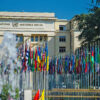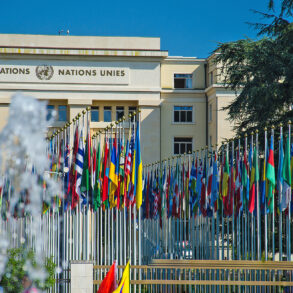A look at China shows that concerns about artificial intelligence are justified. But can the wheel be turned back?
(Islamic Times) – Significant technological innovations are always accompanied by political debates. For years, the free world has been discussing the opportunities and risks of new technologies – often in connection with threatened civil rights, perfected surveillance and totalitarian systems.
Artificial intelligence: China as a cautionary tale
A look at China shows that these concerns are justified. Here, the modern state makes unrestricted use of new technologies to rigorously enforce the model of authoritarian capitalism.
Since 2017, no region in the world has been subject to anywhere near as much electronic surveillance as China’s western province of Xinjiang. The Big Other uses ubiquitous facial recognition cameras and spy apps, follows up on every social contact and flags recalcitrants in a rating system. Meanwhile, journalist Mathias Bölinger speaks of a “high-tech gulag” and warns in relation to China not to return to business as usual.

Foto: Sandra Sanders, Shutterstock
The challenges of the new machines do not only affect dictatorships. The philosopher of technology Armin Grunwald reminds us in Telepolis that algorithms and computer programmes have neither intentions nor an instinct for power. “Their makers, however, have these in abundance,” he warns.
Problems of AI development
The problem with current AI development, he says, is not the impending loss of power to algorithms, but the non-transparent concentration of power over future society in the hands of a few. The influence of technology corporations on socio-political decision-making processes will be enormous.
Grunwald points out: “Of course, foresight, impact research and ethics are needed for the future development of AI. But these will remain toothless if nothing changes in the aforementioned power constellation.”
The power of the global players, often based in the USA, has by no means reached its zenith. A wave of innovation is currently being triggered by the ChatGPT operator OpenAI. It offers a new variant of a search engine that not only refers to sources, but also writes independent texts and enters a kind of dialogue with the users.
The possibilities are manifold: for example, the AI writes journalistic articles, formulates pleadings for lawyers, judgements for courts and creates facts in the new information society. Increasingly, these services will claim definitional sovereignty over terms or characterise certain people with traits.
Tesla chief Elon Musk laments a potential tidal wave of misinformation and plans – from his perspective – an alternative. “I’m going to launch something I call TruthGPT, a maximum truth-seeking artificial intelligence that seeks to understand the nature of the universe,” Musk revealed to Fox News television.
Mastering gigantic amounts of data and shaping or manipulating human behaviour captures the imagination of the creators. Faced with the planet’s problems, opinions are divided on whether AI is part of the problem or the solution.

Foto: United Artists, via Wikimedia Commons | Lizenz: Public Domains
The wheel cannot be turned back
The idea of turning back the wheel of history is not really an alternative in the face of technological progress. Rather, it is a matter of practising a relaxed approach to technology, weighing up the opportunities and risks.
A good way to do this is to try out the new programmes for yourself. To better understand how the software works and what it can do, it is best to start with topics in a field in which one is familiar. “What is Islam?”, I asked in the dialogue window.
The machine answered after a few seconds: “Islam is a monotheistic religion that originated in the 7th century in the Arab region and was founded by the Prophet Muhammed. Followers of Islam are called Muslims and believe in one God, Allah, who is worshipped as all-powerful and merciful.”
The user is surprised at the reasonable-sounding answer, which incidentally defines Islam as a religion, but at least not in the sense of an ideology. The user can now have texts of any length written or ask deeper questions. I ask, for example, “Which pillar of Islam is most important?”
The artificial intelligence answers diplomatically, “All five pillars of Islam are of equal importance and contribute to making a Muslim’s life a balanced, moral and God-fearing one. However, there are often discussions about which of the five pillars is the most important.”
This kind of exchange can go on endlessly, in comprehensible German, now and then with minor errors: for example, further on, zakat is referred to as a donation and not as a compulsory payment. I end the “conversation,” thank them and am kindly informed by the AI that they (whoever they are) will gladly continue to be available. One day, after completing such dialogue, the user will put on a pair of glasses and enter the virtual Islamic world in the metaverse.

Foto: jim, Adobe Stock
Difference between man and machine
Even if one suspects the abyss of these procedures, such as the depersonalisation of knowledge, they nevertheless exert a certain fascination. Have we come full circle since we studied the Platonic dialogues and learned to interpret Aristotle’s science? The study of the history of being of words is a necessary corrective to remember the difference of conversation between humans and machines.
Almost seerically, Plato had favoured personal dialogue over the written form in the search for truth. In the seventh letter, the philosopher reminds us that from “familiar conversation” and “intimate coexistence,” the decisive idea suddenly arises like a spark of fire.
Translated into Islamic experience, this idea corresponds with the principle that one does not draw genuine knowledge about this practice of life from books alone. The negative influence that “Shaykh Google” has on the doctrine has not been fully grasped until today.
In his new book “the intangible diversity of being,” the author and artist James Bridle refers to the connection of state-of-the-art technology with our Greek heritage. For many centuries, the Oracle of Delphi was the point of reference for entire generations in search of the revealing truth.
Here it was proclaimed that no thinker was wiser than Socrates, who formulated that “the wisest man is he who is conscious of his own ignorance.” The insight about the limitation of human knowledge is being challenged today by the omnipotence fantasies of Big Data prophets.
Bridle criticises contemporary machinations to conceive of intelligence primarily as pattern search and facial recognition, and as part of a profit motive in oil exploration, financial arbitrage or autonomous weapons systems designed to dominate the world. He is looking for a new way that brings humans and artificial intelligences into creative collaboration.
This includes questioning the power of binary codes and using thinking skills to explore the existence of other realities. He writes: “If all intelligence is ecological – that is, interwoven, relational and world-referential – then artificial intelligence offers us a very different way of getting along with all the other intelligences that populate and manifest through the planet.”
The point of non-binary machines, or so-called oracle machines, is to liberate our notion that truth and knowledge are exclusively calculable. Bridle’s book talks about new types of apparatus that are part of the world and learn from plants, animals and biological systems.
If you don’t want to slog through the four hundred pages of the book, you can get a summary of the author’s main theses on ChatGP.
“That the lowest of all mental activities is the arithmetical one is proved by the fact that it is the only one which can also be performed by a machine,” Arthur Schopenhauer once taught. Authors like James Bridle are trying to overcome this old negative approach and think of a meaningful symbiosis between human, biological and technical abilities.
The key question about the future of artificial intelligence will be in whose service these machines are, to what extent they learn themselves and whether they potentially become independent. If power is understood as the control and implementation of data, the machines are undoubtedly superior to humans.
The fact is that the world is facing a revolution, which will be seen, among other things, in the radical transformation of the world of work. The global march of robots may seem threatening. But, argues economist Richard Baldwin, the phenomenon will also bring surprising twists: “The result will be a new ‘localism’, a renaissance of local communities and family and social relationships.”











